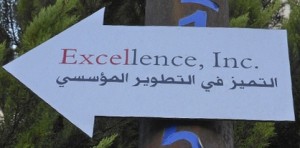 In Excellence-To What End? I made the case that serving people–all of them, from artists to “the great unwashed”–was the purpose of seeking excellence. In the months since that post, I’ve reflected more on this issue, one that is central to our field and of vital importance to all of us in it, myself included. It is of such weight that many of our organizational mission statements include it as a central “reason for being.” I still would like us to hold in mind that excellence is not something to be sought in a vacuum. Excellence is something of value because people deserve it.
In Excellence-To What End? I made the case that serving people–all of them, from artists to “the great unwashed”–was the purpose of seeking excellence. In the months since that post, I’ve reflected more on this issue, one that is central to our field and of vital importance to all of us in it, myself included. It is of such weight that many of our organizational mission statements include it as a central “reason for being.” I still would like us to hold in mind that excellence is not something to be sought in a vacuum. Excellence is something of value because people deserve it.
Many of our organizational mission statements cite “world class” (or its functional equivalent) as the artistic standard sought, a standard central to the mission. For the most part, such statements assume technical excellence as the basis for that standard. (Granted, technical excellence is important, but as I suggested in Quality and Community, it is not–and should not be–the only criterion by which we judge excellence.) Apart from the practicality of such goals from a resource perspective, if all arts organizations who so aspired were indeed world class, what would that mean? It sounds a bit like Garrison Keilor’s Lake Wobegon where all the children are above average.
The Radical Notion
What if instead of an abstract excellence the goal were to be deeply valuable to the community in which the organization resides? This would, of course, require knowing the community well and programming to address its interests. I’m suggesting here that another way to view excellence is on the degree to which an organization enhances the life of its community. The goal of world class status in a strictly artistic sense is inwardly focused and, it could be argued, narcissistic. On the other hand, being “world class” in value to the community has the advantage of providing benefit to that community in ways that will gain support for the organization, furthering its sustainability.
Once again, before I stop here, let me reiterate that serving a community does not necessitate lowering standards, unless “lowering standards” presumes having no concern for those not already “believers” or no interest in being of value to them. It does mean caring about being of importance in the community. To be clear, my “portfolio” is with the arts industry–producing and presenting organizations and those that service them. I make no case for all artists pursuing a community engagement agenda. At most, I’d like to provide the rationale for any who wish to do so.
I get tired of hearing comments that community awareness demands (or implies) presenting schlock. I grant that there are examples of bad work being done in the name of engagement. But the assumption that that is what engagement takes often appears to be the product of willful arrogance, lack of imagination, or laziness of thought. Great art can and often does come out of awareness of people’s current interests and concerns. And, of course, some great art also looks forward, ahead of the pack–sometimes way ahead. So it should. But that is not what much of the arts industry today is presenting; the repertoire is often showing a path to the past, a past that has little cultural or social relevance to any but a narrow slice of the population. That is not a path to sustainability . . . or even survival.
Engage!
Doug
Photo:![]()
![]() Some rights reserved by mikecogh
Some rights reserved by mikecogh

This is a great blog, I am very impressed, I have been arguing a similar position in Australia for some time. In the sense that excellence is not a distant relative of community engagement or community art.
Great art doesn’t come ” out of awareness of people’s current interests and concerns.” It comes out of the artists awareness. And that awareness and the product of that awareness can still be assessed as either something average or something excellent. I think you are just kicking the can under the bed.